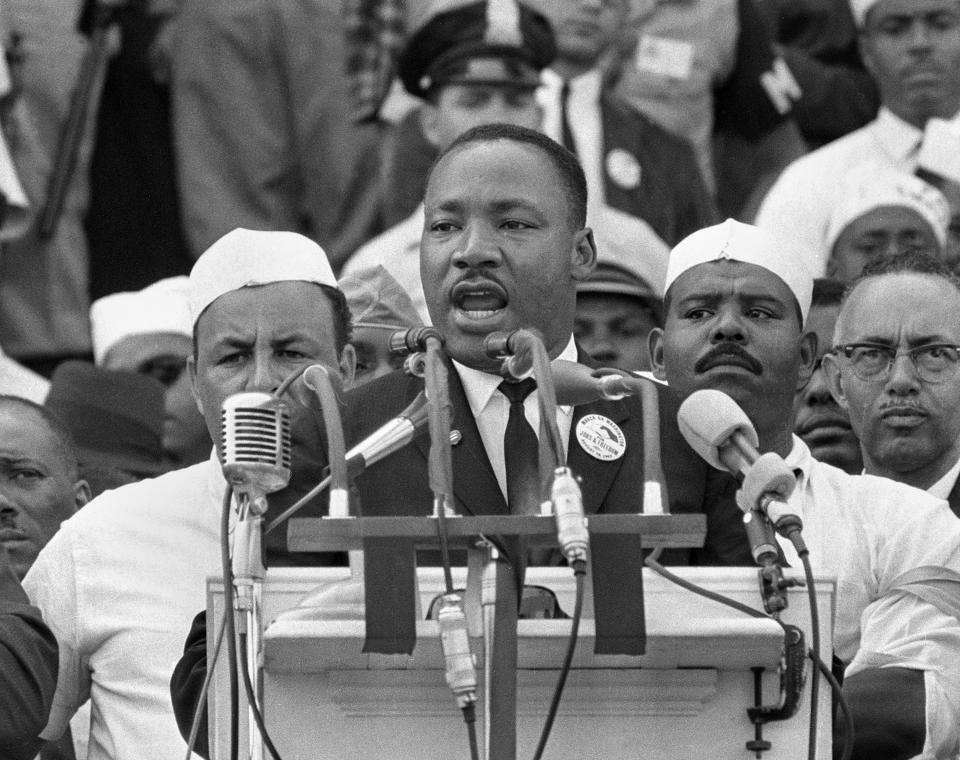Message from Martin Luther King Junior's forgotten 1964 Arizona speech still suited for 2024
- Oops!Something went wrong.Please try again later.
- Oops!Something went wrong.Please try again later.
Dr. Martin Luther King Jr.'s legacy continues to thrive through history, art, and culture. As we approach the day dedicated to honoring his life and reflect on his impactful words and courageous actions, it's evident that he has left a lasting mark on the civil rights movement and the nation.
Interestingly, Dr. King's influence extends to a nearly forgotten piece of history in Arizona, underscoring the broad reach of his impact.
Martin Luther King's 1964 Arizona speech
"I need not pause to say how very delighted and honored I am to have the opportunity of coming oncemore to the state of Arizona and the opportunity of making my first public appearance here in the city ofPhoenix, Arizona."

These are the words spoken by Rev. Martin Luther King Jr. on the steps of Arizona State University's campus on June 3, 1964, just weeks before the passage of the Civil Rights Act, which outlawed segregation based on race or color.
This year commemorates the 60th anniversary of King's "Religious Witness for Human Dignity" speech, delivered at the old Goodwin Stadium to an audience of 8,000 listeners. In this speech, he challenged them to embrace a moral and ethical commitment, urging people to live together as brothers regardless of race.
"We must all learn to live together as brothers, or we will all perish together as fools," said King in his speech.
The historic speech is relatively obscure due to the loss of the audio tape, which remained undiscovered until 2013. Once the tape was found and sent to the ASU Archival Department for restoration and transcription, it resurfaced as an important and valuable part of both the civil rights movement and Arizona's history
How did Martin Luther King Jr. Day become a holiday?
Not every historical figure gets a federally recognized day in their honor, so how did Martin Luther King Jr. Day become a national holiday?
According to The King Center, Martin Luther King Jr. Day originated after his assassination in 1968, but it wasn't automatically accepted as a holiday by Congress until 20 years later. Even after its congressional acceptance in 1986, all 50 states did not officially recognize it as a holiday until the year 2000.
The journey towards making Martin Luther King Jr. Day a holiday started when Rep. John Conyers, D-Mich, introduced it to legislation in 1968, as mentioned by the National Museum of African American History and Culture. Subsequently, annual ceremonies began in Atlanta on King's birthday in 1969. During these ceremonies, The King Center started seeking people's support for the day to be federally recognized.
In the 1970s, some states, including Illinois, Massachusetts, and Connecticut, started recognizing Martin Luther King Jr. Day on a state level. However, when the bill came up for a vote in Congress in 1979, it lost by five votes in the House.
Following the defeat of the bill, Stevie Wonder released a song titled "Happy Birthday" in an effort to garner support for the holiday's federal recognition. The song became a hit, as reported by The King Center. After two years, Coretta Scott King, King's widow, along with Stevie Wonder, submitted 6 million signatures supporting King's holiday to the Speaker of the House in 1982.
According to The King Center, Martin Luther King Jr. Day became a federally recognized holiday on November 3, 1983, when President Ronald Reagan signed the bill. This marked the third Monday of January as a national holiday in honor of Dr. King.
This article originally appeared on Arizona Republic: Forgotten Arizona speech still relevant 60 years later

